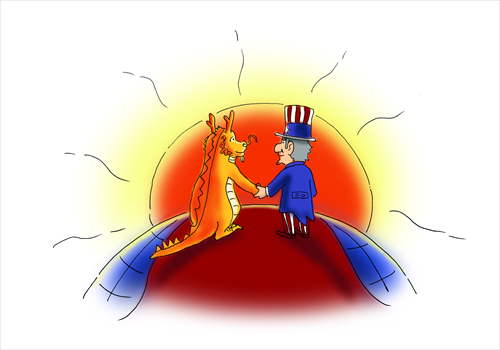International governance meets needs of China and US

Illustration: Liu Rui/GT
International governance is an outcome of industrialization. The process of pursuing resources links economic, political and social activities in different regions. Thus people, with divergent cultural and social backgrounds, must establish common rules to abide by, in order to maintain regional security and development.
Following the end of WWII, an international governance system was established by the victorious nations, including China. This system is supported by three pillars: the UN, the World Trade Organization and the International Monetary Fund. This framework, however, was established, to a large extent, in the context of US dominance. Yet the age of a multipolar and economically integrated world is coming into view. It is both a challenge and an opportunity to conform to these irreversible trends in international governance.
Obviously, China's rise is the root cause for multipolarization and economic integration. On the one hand, by involving itself into the current international system, China is developing rapidly. This has resulted in the fundamental change to the world, the first of its kind in history that took place in peacetime. On the other, thanks to globalization and China's development pattern, the multipolar world is becoming increasingly dependent on economic integration.
The challenges are unprecedented in history. First of all, the increasingly deteriorating environment poses a threat to all human beings. The number of people involved in the first two waves of modernization was 40 million in the first wave and 400 million in the second.
Currently, the rapid growth of Asia-Pacific countries, including China and India, has brought forth the third wave of modernization, which is influencing almost 4 billion people. The problem is that while large-scale industrialization, characterized by urbanization and excessive consumption of natural resources, pushed the previous modernization, it will, for sure, trigger irreversible environmental problems.
In addition, the global financial order, dominated by debtor nations, faces challenges. Developed countries, except for Germany, have all become debt-ridden, while developing nations, represented by the BRICS, have accumulated a large amount of money. Yet debtors still have the control over the global financial rules. The accumulated fortune is thus kidnapped by the debtors. This is a very dangerous situation.
The current security architecture also has limitations. Following the collapse of the Soviet Union, global security architecture, based on the Washington-dominated security alliance, is controlled by the US. This security alliance is still playing a role in modern times. As the world is becoming increasingly multipolar, the security alliance has triggered wars and conflicts.
The above three types of challenges are the root cause for global economic and political unrest. China, as a major power, should take on the responsibility to tackle the challenges. It will have an influence on the stability and development of not only China itself, but also the international community. On the other, as the biggest developed country dominating the global order, the US should also shoulder responsibility. Therefore, the ultimate goal of China-US cooperation is to work together to overcome the above three challenges and safeguard world peace and sustainable development.
One of the most concrete and anticipated achievements of Beijing-Washington cooperation is the consensus forged over climate change and military communication. The progress in economic matters is the most evident part of China-US cooperation.
We predict that Beijing and Washington will seek deeper cooperation in international governance and jointly control unavoidable conflicts of interest. Promoting substantial development in international governance is a vital interest shared by both China and the US.
The authors are respectively a professor from the National University of Singapore and a research fellow from the National University of Singapore. opinion@globaltimes.com.cn